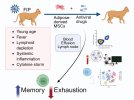UC Davis researchers find cats could help us learn about long COVID. They've found a new cell therapy boosts immune systems in cats with severe coronavirus.
www.eurekalert.org
News Release 14-Jul-2025
What cats may teach us about Long COVID
New cell therapy boosts immune recovery in cats with severe coronavirus
Peer-Reviewed Publication
University of California - Davis
image:
Leo, a 10-month-old tabby cat, is cared for by Clinical Trials Coordinator Jully Pires after receiving treatment as part of a clinical trial on FIP at UC Davis School of Veterinary Medicine. (School of Veterinary Medicine)
Feline infectious peritonitis, or FIP, is a serious and historically fatal disease in cats caused by a coronavirus. It behaves in many ways like severe coronavirus infections in humans, causing widespread inflammation, T cell exhaustion, and chronic immune dysfunction. Scientists at the University of California, Davis, have found that mesenchymal stromal cells, or MSC therapy, in combination with antiviral drugs, helped cats’ immune systems recover and reduced systemic inflammation. The study was published in STEM CELLS Translational Medicine.
“Our findings support the idea that FIP in cats is a useful model for studying long-term immune problems after a viral infection — something that also happens in some people after illnesses like COVID-19,” said corresponding author Amir Kol, associate professor in the Department of Pathology, Microbiology and Immunology at the UC Davis School of Veterinary Medicine. “It shows that MSC therapy might not only reduce short-term inflammation but help bring the immune system back into lasting balance.”
FIP in cats
Feline coronavirus usually infects the cells lining a cat’s intestines and causes only mild stomach issues. In some cats, a mix of genetic and environmental factors can alter the virus’ behavior, allowing it to infect immune cells and spread throughout the body. The virus can develop into either wet FIP, where fluid builds up in the chest or belly, or dry FIP, where fluid doesn’t build up but inflammation still affects organs. Both types of FIP cause fever, widespread inflammation, problems in multiple organs and a drop in important immune cells. It’s estimated to affect around 2% of cats, most commonly young cats in shelters or catteries.
Until recently, most cases of FIP were fatal. In 2018, UC Davis researchers first reported that an antiviral agent called GS-441524 successfully cured cats with FIP. But the patent holder at the time never applied for approval to sell it. Only within the last year has a U.S. veterinary compounding pharmacy made the drug available in the country.
Long-term FIP
As a result, few studies have tracked cats long-term after they recover from FIP. But Kol said some of these cats still have enlarged lymph nodes, which happens when part of the immune system stays active. This suggests that even after the cats appear to recover, their immune systems may still be working overtime — similar to how some people experience long COVID after recovering from COVID-19. This ongoing immune stimulation may signify a “long-FIP”-like syndrome in cats.
“Even if you treat the infection with antivirals, your immune system, oftentimes, still won't go back to normal or where it was before infection,” said Kol. “This might have long-lasting effects on your health and this study shows that MSC may help.”
Clinical trial with antivirals and MSC
Researchers wanted to see whether cellular therapy could enhance immune recovery in the cats with enlarged lymph nodes. For this clinical trial, one group of cats with FIP received antiviral drugs along with infusions of MSCs, and the other received an antiviral drug and placebo infusions.
“As expected, all cats survived because the antiviral treatment is effective in getting rid of the virus,” said Kol. “But we definitely saw evidence of immune recovery in those cats that were treated with MSC compared to the ones that weren’t.”
Researchers found that the treated cats had fewer overly active T and B cells (which can cause immune overdrive), and more regulatory T cells (which help calm the immune system). Other tests confirmed that this therapy helped exhausted immune cells recover and possibly form long-term "memory" cells that protect the body in the future.
Scientist found the treatment safe with no serious side effects.
These findings not only matter for helping cats with FIP and their owners, but they could also help scientists better understand similar viruses in humans, like COVID-19.
“It’s important to understand that many pets suffer from diseases that are similar to human diseases,” said Kol. “Veterinary medicine is a wonderful platform to conduct translational science that helps both pets and humans.”
Other authors of the study include Brian Murphy, Patrawin Wanakumjorn, Kazuto Kimura, Diego Castillo, Rachel Formaker, Rachel Qiao, Terza Brostoff, Ehren McLarty, Katherine Farrell, Raneesh Ramarapu, Jully Pires, Tamar Cohen-Davidyan, Jennifer Cassano and Krystle Reagan of UC Davis.
The research was supported by the National Institutes of Health and the Center for Companion Animal Health at UC Davis.
Journal
Stem Cells Translational Medicine
DOI
10.1093/stcltm/szaf025
Method of Research
Randomized controlled/clinical trial
Subject of Research
Animals
Article Title
MSC Therapy Improves Immune Recovery in a Feline Model of Severe Coronavirus Infection
Article Publication Date
14-Jul-2025
COI Statement
The authors have declared that no conflict of interest exists.

